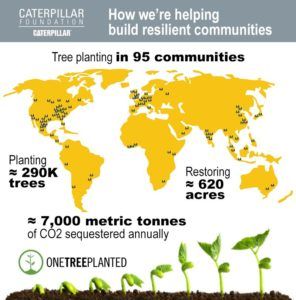OTG: Caterpillar Foundation to Fund Tree Planting in Menominee County this September
 The Caterpillar Foundation (of Caterpillar Inc.) announced in the spring of 2021 that it would be partnering with One Tree Planted, a nonprofit dedicated to global reforestation efforts, to collaborate on and fund tree plantings in 95 communities across the globe. According to the press release
from the two organizations on April 22, 2021, these tree plantings will help recognize Caterpillar’s more than 95-year commitment to building a better world while simultaneously supporting restoration efforts that will improve native biodiversity, air and water health, soil stability, and healthier ecosystems. Local conservation organizations in communities around the world were contacted, and Michigan United Conservation Clubs (MUCC) was selected as one of the recipients of funds to host a tree planting in Menominee County, Michigan.
The Caterpillar Foundation (of Caterpillar Inc.) announced in the spring of 2021 that it would be partnering with One Tree Planted, a nonprofit dedicated to global reforestation efforts, to collaborate on and fund tree plantings in 95 communities across the globe. According to the press release
from the two organizations on April 22, 2021, these tree plantings will help recognize Caterpillar’s more than 95-year commitment to building a better world while simultaneously supporting restoration efforts that will improve native biodiversity, air and water health, soil stability, and healthier ecosystems. Local conservation organizations in communities around the world were contacted, and Michigan United Conservation Clubs (MUCC) was selected as one of the recipients of funds to host a tree planting in Menominee County, Michigan.
MUCC is the largest state-specific conservation organization in the United States, and our strong membership and proven ability to recruit volunteers from all outdoor recreation arenas are what made us a natural choice to lead the tree-planting effort in the Upper Peninsula.
Ensuring these trees would be planted in an area that would benefit a wide variety of native wildlife was the main goal for MUCC, and we reached out to local Michigan Department of Natural Resources (DNR) Wildlife Division staff to help design the project on public land in Menominee County to meet wildlife habitat management goals within the Escanaba River State Forest.
A mix of trees and shrubs including highbush cranberry, hawthorn and crabapple was selected. These are native soft mast-producing species that will benefit wildlife such as wild turkey, ruffed grouse, white-tailed deer, golden-winged warblers and American woodcock. These trees will also enhance the natural openings where they will be planted while simultaneously supporting the health of the forest they will be planted within.
Volunteers are invited to join MUCC’s award-winning On the Ground (OTG) wildlife habitat improvement program, the Michigan DNR, and Caterpillar Inc. to help plant and fence more than 100 trees and shrubs within the Escanaba River State Forest on Saturday, September 18. Not only will this tree planting benefit overall forest health and wildlife habitat, but it will also improve experiences for recreationists with interests like hunting, hiking and birding.
To learn more about this event or to register, please visit the link HERE . Additionally, please direct any questions about this tree planting event to MUCC Habitat Volunteer Coordinator Makhayla LaButte at mlabutte@mucc.org.
Recent Posts



